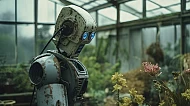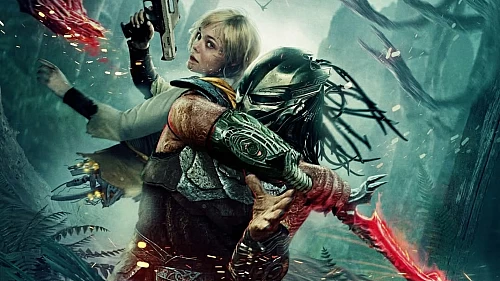This post was published by a guest. The views expressed are those of the author and do not necessarily reflect the views of Scified.com.
Science fiction has become the literary equivalent of a cultural GPS, pointing us toward every major societal conversation today. The genre isn't just predicting flying cars anymore; it's wrestling with artificial intelligence, climate catastrophe, and social justice.
The women driving these conversations aren't just writing books; they're architecting the future of human thought.
And it's not just books anymore. Sci-fi's influence is everywhere, even in video games. Look at Terminator. It started as a cult film, exploded into a franchise, and then jumped into gaming with full force: shooters, survival games, and even RPG elements.
The brand got so huge that casino developers turned it into a real money slot game. Yes, really. People are literally spinning reels based on cybernetic apocalypses on real money online casino platforms. And they're loving it.
If you really want to get what's happening in science fiction right now, like really get it, you've got to know these four women.
Connie Willis
Connie Willis owns time travel fiction the way Stephen King owns horror. Her Doomsday Book doesn't just send a historian back to medieval England during the Black Death. It makes you smell the plague, feel the mud, and understand exactly why most people died before age 30. The research is so thorough that academic papers look sloppy.
To Say Nothing of the Dog (1998), one of her greatest works, shows Willis' talent for blending gentle comedy with intellectual rigor, no light fluff but thoughtful wit.
The truth is, Willis doesn't just write about the past; she resurrects it. Her time travel stories work because she understands that history isn't just dates and events. It's people trying to survive circumstances they never chose.
Octavia Butler
Octavia Butler died in 2006, but her books are more powerful than ever. Kindred tells of Dana Franklin, a Black woman from 1976 who is pulled back to a plantation in the early 1800s, a time travel story that lays bare the brutality of slavery.
Her Parable novels, published in the 1990s, eerily predict the modern climate crisis, social inequality, and political unrest. It's chilling how on target she was.
Today, Kindred is taught in high schools and universities and has been selected for community-wide reading programs. Butler didn't just write stories; she expanded on what science fiction could address.
As the first Black woman to win both the Nebula and Hugo Awards and a MacArthur "Genius Grant," she opened doors for countless writers. Her influence is clear in modern voices across Afrofuturism, proof that sci-fi can tackle real-world issues in deeply human, resonant ways.
Micaiah Johnson
Micaiah Johnson is doing something really cool with sciâfi, especially her debut, The Space Between Worlds, which came out in August 2020, but it feels brand new. The story follows Cara, who can travel to parallel Earths but only to the ones where her counterpart has died. That's wild.
What's really smart is how Johnson uses this setup to dig into real issues like race, class, and who gets a fair shot in life. She's not just telling a fun story for entertainment but portraying the reality of our world now.
She takes the classic multiverse idea and gives it fresh energy. It's no wonder people are paying attention; critics loved it, and the book even won awards in 2021. It's proof that sciâfi is still growing and changing and has a lot to say.
Becky Chambers
Most SF is about disaster, but Becky Chambers writes about futures where things are working, and it's more compelling than doom and gloom.
Her Wayfarers series, beginning with The Long Way to a Small, Angry Planet (2014), follows a found family spaceship crew, not soldiers or heroes, just people building trust across species.
She skips explosions and chooses tropes, focusing instead on how different beings learn to live together.
Then there's her Monk & Robot duology. In A Psalm for the Wild Built (2021), robots who once walked away from humanity return not to conquer but to talk about what really matters: life, purpose, and connection.
On paper, it sounds slow and even dull, but reviewers call her optimistic vision "radical" in a genre fixated on dystopia.
It's not hype. Her work is award-winning. The Wayfarers series claimed the 2019 Hugo for Best Series, and A Psalm for the Wild Built won the 2022 Hugo for Best Novella. She proves hope can be as gripping as despair.

Sci-Fi Conventions Reveal Exclusive Behind-The-Scenes Content
Fans were buzzing all week about San Diego Comic‑Con 2025 and everything it revealed. From trailers to sneak previews and creator chats, the excitem...

The Economics of Credit-Based Dating: Estimating Real Costs Before They Estimate You
Credit-based dating platforms can feel deceptively light at the door: sign up, browse profiles, get messages quickly, and only then discover that mean...

How Sci‑Fi Culture Inspired Future Tech Careers and Online Work in 2026
Explore how science fiction influences technology careers and online work in 2026, linking future tech inspiration with real opportunities and remote talent platforms.

Benefits of Using the Mobile Client: An Analysis of the 1x Casino App Download
Playing casino games on your phone should be quick, safe, and actually enjoyable (not a chore). The 1x Casino mobile client aims to package your accou...

CryptoEasily launches stable-yield cloud mining contracts, creating a new way for BTC and XRP holders to earn $7,700 per day.
As the price of Bitcoin and the value of XRP continue to decline, with Bitcoin falling below $75,000 and XRP dropping to around $1.50, market sentimen...


